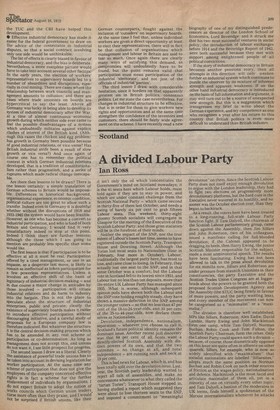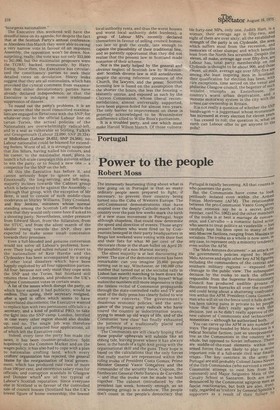A divided Labour Party
Ian Ross
it isn't only the oil which 'concentrates the Government's mind on Scotland nowadays; it is the 41 seats here which Labour holds, must hold again if they are to stay in power, and which are under constant challenge from the Scottish National Party — which came second in thirty-five of them last October, and needs a swing of barely six per cent to grab fifteen Labour seats. This weekend, thirty-eight gloomy Scottish socialists will congregate in Glasgow for the meeting of the Executive of the Scottish Labour Party, and those grim statisticswill be in the forefront of their minds.
Neither the impact of the SNP, nor the true extent of Labour's losses last time, seems to have registered outside the Scottish Party, Transport House and Downing Street. Although the Tories lost most seats to Nationalism (four in February, four more in October), Labour; traditionally the largest party here, has most to lose, and came close to losing. In February, they actually lost one seat to the SNP, and in that sense October was a comfort; but the Labour vote in Scotland fell to its lowest since 1931, and Labour lost no less than ten deposits, more than the entire UK Labour Party has managed since 1935. What is worse, although subsequent opinion polls have shown both the Labour and the SNP vote holding roughly steady, they have shown a massive defection to the SNP among the younger voters — so that no less than 47 per cent of the 18-to-24-year-olds, and '35 per cent of the 25-to-44-year-olds, now declare themselves as Nationalists.
Devolution, independence, nationalism, separatism — whatever you choose to call it, Scotland's future political identity remains the dominant issue. Another recent poll discovery was that 64 per cent of all Scots want a directly-elected Scottish Assembly with distinct powers of its own, and that the two extremes — no change at all, and total independence — are running neck and neck at 19 per cent.
This is bad news for Labour, which is, and has been totally Split over the devolution issue. Last: year, the Scottish party leadership wanted to reject all talk of assemblies, and make no concessions whatsoever to what they called the "tartan Tories"; Transport House stepped in, having studied a report which suggested they were about to lose thirteen seats to the SNP, and imposed a commitment to "meaningful
devolution" on them. Since the Scottish Labour Party does not itself enjoy enough devolution to argue with the London leadership, they had to fight two elections on progressively more devolutionary platforms, but the hard core in the Executive never wavered in its hostility, and no sooner was the October election over, than they began to-backtrack.
As a result, the voters here have been treated to a long-running, full-scale Labour Party function fight. If Tam Dalyell, the chairman of the Scottish Labour parliamentary group, came, down against the Assembly, then Jim Sillars and John Robertson, two of his colleagues, issued a manifesto calling for full-blooded devolution; if the Cabinet appeared to be dragging its heels, then Harry Ewing, the junior Scottish Minister responsible for the subject, made a most unministerial speech. The results have been fascinating: Ewing has not been allowed to talk to the press about devolution. for six months now, Sillars and Robertson are under pressure from staunch Unionists in their constituencies, the party Executive and the Scottish Trades Union Congress are at loggerheads about the powers to be granted both the proposed Scottish Development Agency and the Assembly (the STUC being firmly in favour of more powers, and the party wanting less), and every member of the movement can now be categorised as a "minimalist" or a "maximalist."
The division is therefore well established; MPs like Sillars, Robertson, Alex Eadie, David ',amble, Harry Ewing and John Mackintosh form one camp, while Tam D,alyell, Norman Buchan, Robin Cook and Tom Fulton, the Scottish Party Chairman, form the other. Only the Labour Party could spawn such a division — because, of course, those diametrically opposed on this issue are quite often in alliance on other quarrels. Sillars, for example, who is now sowidely identified with "maximalism" that socialist nationalists are labelled "Sillarsites," adopts much the same position as Norman Buchan and Robin Cook on such other sources of friction as the wages policy, nationalisation and defence. Mackintosh is the most lucid and articulate maximalist of them all, yet in a minority of one on virtually every other topic; and Tam Dalyell, a bastion of the moderates in UK terms, finds himself a spokesman of the Marxist internationalists whenever he attacks -bourgeois nationalism."
The Executive this weekend will have the dreadful issue on its agenda; for despite the fact that at the Scottish Party's annual conference in Aberdeen this March they were able to swing a very narrow vote in favour of an impotent Assembly, the opposition won't lie down. Not surpriSing, really; the vote was not only 353,000 to 341,000, but the maximalist proposers were the TGWU, backed, strenuously, by Harry Ewing. Since then, the Executive has circularised the constituency parties to seek their detailed views on devolution. Heavy leaks suggest that they are all minimalists, which has provoked the cynical comment from maximalists that either devolutionary parties have already declared independence, or that the Executive is indulging in some traditional suppression of dissent.
To round out the party's problems, it is an open secret that the most committed maximalists are engaged in flirtations with the SNP; for whatever may be the official Labour line on tartan Tories, the actual policies of the Nationalists are overwhelmingly radical-left, and in a seat as vulnerable as Stirling, Falkirk and Grangemouth (Labour 22,090, SNP 20,324) or Midlothian (Labour 28,652, SNP 24,568), no Labour nationalist could be blamed for extending feelers. Worst of all, it is strongly suspected that Jim Sillars, having nailed his colours, and his career, to the maximalist mast, plans to !aunt!) a full-scale campaign this autumn either to win the party, or to found a new one a competitor for the SNP on the left.
All this the Executive has before it, and cannot seriously hope to ignore or solve. Emotionally, the long-serving, and left-wing, majority inclines towards the Cabinet group which is believed to be against the Assembly although that group, with the exception of Mr Benn, is said to consist of such middle-class moderates as Shirley Williams, Tony Crosland, and Roy Jenkins, ministers whose normal standing among the Scottish Left reflects the view that they would only come here if asked to a shooting party. Nevertheless, under pressure from Edward Short, from' the Sillarsites, from the STUC, and from the silent march of the idealist young towards the SNP, they are expected to make some small concession towards their promises. Even a full-blooded and genuine conversion would not solve all Labour's problems, however. Their long and sullen refusal to revert to. the nationalism of Keir Hardie and the Clydesiders has been accompanied by a string of other local disasters which have been happily exploited by all four opposition parties. Alt four, because not only must they cope with the SNP and the Tories, but Scotland still returns three Liberals, and produces the UK's highest Communist votes in certain seats. A list of the issues which disrupt the party, or which have earned it bad publicity, would be endless. This spring, their secretary resigned, after a spell in office which seems to have exacerbated discontents; the Executive wanted to replace him with two permanent officials a secretary, and a kind of political PRO, to take the f,ight into the SNP camp. London, terrified in case every other region should also double up, said no. The single job was therefore advertised, and attracted four applications, all of which left the Executive cold.
Indeed, every time the party has made the news, it has been counter-productive. Split hopelessly on the Common Market and on the wages policy, it has also had to cope with a plan to nationalise crofting land, which every crofters' organisation has rejected, the general' blame for the reorganisation of local government, which has produced rate-rises of more than 100 per cent, and enormous salary rises for officials, and corruption scandals in Glasgow and Dundee which' are all too typical of Labour's Scottish reputation. Since everyone else in Scotland is in favour of the controlled sale of council houses (Scotland has the UK's lowest figure of home ownership, the lowest local authority rents, and thus the worst houses and worst local authority debt burdens), a group of Labour MPs recently declared themselves in favour of selling council homes: too late to grab the credit, late enough to capsize the plausibility of their traditional line,. and so patently opportunist that they did not realise that the present law in Scotland made nonsense of their scheme.
Nor is the party helped by the general and obvious neglect of Scottish law by Westminster: Scottish divorce law is still antediluvian, despite the strong reformist pressure of the Church, thelawyers, and the press; Scottish licensing law is based on the assumption that the shorter the hours, the less the boozing blatantly untrue, and exposed as such by the Clayson Commission, whose liberal recommendations, almost universally supported, have been pigeon-holed for almost two years. The only barrier to improvement on these is generally acknowledged to be Westminster indifference allied to Willie Ross's puritanism.
It is a troubled party, and one which must make Harold Wilson blanch. Of those vulnera
opectazor August 16, 1975 ble forty-one MPs, only one, Judith Hart, is a woman; their average age is fifty-two, and eight of them are over sixty; all the established strength of the party is on Clydeside, the area. which suffers most from the recession, and memories of other slumps: and which benefits . least from the North Sea scramble. Despite the eleven, all make, average age over fifty. -five, are Labour has, total party membership on red Clydeside is thought to be about 900, and those eleven, all male, average age over fifty-five are . among the least inspiring men in Scotland, their qualification for election has been, with, rare exceptions, time served on the venal and philistine Glasgow council, the begetter of such. socialist triumphs as Easterhouse, the country's worst urban deprivation, and a monster motorway system in the city with the lowest car-ownership in Britain. It is not really a question of whether the SNP bandwagon ‘a juggernaut whose moment has increased at every election for eleven Years polls? ceased to roll; the question is', what on earth can Labour offer to get anyone to the



































 Previous page
Previous page